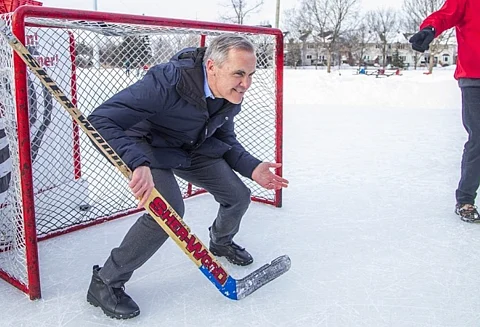

It’s the same old story, with a new preamble but same ending.
That sums up the main Liberal leadership contenders on what promises to be one of the most defining — and divisive — issues of the upcoming election campaign to replace Prime Minister Justin Trudeau.
That’s because both Chrystia Freeland and Mark Carney are offering up yesterday’s leftovers on a supposedly new platter.
Carney, the clear frontrunner to become Canada’s next prime minister on March 9, has unveiled a climate policy that scraps the consumer tax but largely mirrors the Trudeau government’s approach to maintaining carbon revenues while shifting costs onto industry.
Carney’s plan, announced this week, eliminates the direct consumer charge on fuels like gasoline and home heating oil, admitting it has become politically toxic amid rising living costs. But rather than abandoning carbon pricing altogether, Carney’s proposal keeps a system in place that will still pass costs onto consumers indirectly.
“The truth is, the consumer carbon tax isn’t working. It’s become too distracting and too divisive. That’s why I will cancel it,” Carney said, echoing criticism long levelled by Conservative Leader Pierre Poilievre, who has built his campaign around the slogan ‘Axe the Tax’.
The irony is Canada's carbon tax will increase to $95 per tonne on April 1, which is a $15 increase from 2024 that will add another three cents per litre of gasoline.
Likewise, Freeland — one of the original architects of the tax — has also vowed to repeal at least the consumer portion.
“We have heard very clearly from Canadians in provinces where there is a consumer-facing price on carbon that they don’t like it,” Freeland said. “That’s something that we have to listen to. Democracy means when people tell you something you have to listen. I will say our party hasn’t been good enough at that. That has to change, and I am going to change that.”
But despite their respective pledges to ‘eliminate’ the consumer portion, both approaches remain fundamentally aligned with the Trudeau government’s broader climate strategy: using financial mechanisms to encourage emissions reductions.
Carney’s plan in particular strengthens the Output-Based Pricing System (OBPS) for industrial polluters, develops a carbon credit market that could impact prices down the supply chain and introduces trade measures to ‘ensure’ Canadian industries remain competitive — all of which have proven to be ineffective at accomplishing the one thing they were meant to, which is actually reduce emissions.
Critics argue that while Carney’s messaging may be different, his approach is still a form of carbon pricing, just under a new label.
“Consumers will still bear the costs of carbon pricing, whether through higher costs on industrial polluters that get passed down, or through market-driven incentives,” said Hadrian Mertins-Kirkwood, a senior researcher with the Canadian Centre for Policy Alternatives.
Carney’s plan also emphasizes government intervention to accelerate the transition to a green economy, including so-called ‘investments’ in clean energy, electric vehicle infrastructure and climate-focused financial policies.
That’s in keeping with his work at organizations such as the UN, World Economic Forum and even the Bank of England to impose carbon-based taxes around the world. But it fails to recognize that there is only one pocket to pick — yours.
Both Carney’s and Freeland’s approach contrasts with Poilievre’s pledge to eliminate carbon pricing altogether, though the Conservative leader has yet to outline an alternative emissions reduction strategy.
“Taxpayers have one simple question for anyone who wants to be prime minister: Will you scrap the carbon tax?” says Canadian Taxpayers Federation director Franco Terrazzano.
“Freeland is running on her experience as finance minister, but she gave a rambling response about listening to Canadians instead of giving a clear and credible answer. Carney is running on his economic expertise as a central banker, but his response didn’t provide any clarity beyond a vague suggestion that he’s working on a replacement scheme.”
“How can Freeland or Carney hope to have a shred of credibility if they don’t have a clear answer to the question: Will you scrap the carbon tax?”
Speaking to The Western Standard on Thursday, Alberta’s Minister of Environment and Protected Places Rebecca Schulz said she doesn’t put much faith in a Liberal government to address environmental concerns such as an emissions cap or electricity regulations — much less, actually reduce emissions.
“We have Mark Carney, who you know very much, has supported that ’Pro Carbon Tax’, pro activist agenda. So we're not seeing anything from them that will essentially move our country in a different direction.”
